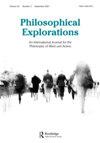Narrative, addiction, and three aspects of self-ambiguity
IF 1.1
3区 哲学
0 PHILOSOPHY
引用次数: 2
Abstract
ABSTRACT ‘Self-ambiguity’, we suggest, is best understood as an uncertainty about how strongly a given feature reflects who one truly is. When this understanding of self-ambiguity is applied to a view of the self as having both essential and shapable components, self-ambiguity can be seen to have two aspects: (1) uncertainty about one's essential or relatively unchangeable characteristics, e.g. one's sexuality, and (2) uncertainty about how to shape oneself, e.g. which values to commit to, actions to pursue, or essential features to identify with. We explain how a narrative account of agency can accommodate these forms of self-ambiguity and argue that such an account also reveals another kind of self-ambiguity, namely, (3) uncertainty about whether one's established self-narrative represents who one really is. We illustrate this third form of self-ambiguity in the context of addiction where people's established addiction self-narratives make it difficult to identify with recovery. We argue that recovery will require embracing, especially, our third form of self-ambiguity as a chance for positive self-transformation. Treatment for addiction should, therefore, support people in going through and ultimately narratively resolving the inevitable self-ambiguities of the recovery process.叙事、成瘾和自我模糊的三个方面
摘要:我们认为,“自我模糊”最好被理解为一个特定特征在多大程度上反映了一个人的真实身份的不确定性。当这种对自我模糊的理解被应用于一种既有本质成分又有可塑造成分的自我观时,自我模糊可以被视为有两个方面:(1)一个人的本质或相对不可改变的特征的不确定性,例如,一个人的性取向,以及(2)如何塑造自己的不确定性,例如,要致力于哪些价值观、要追求哪些行动或要认同哪些基本特征。我们解释了代理的叙述如何适应这些形式的自我模糊,并认为这样的叙述也揭示了另一种自我模糊,即(3)关于一个人的既定自我叙述是否代表了一个人的真实身份的不确定性。我们在成瘾的背景下说明了第三种形式的自我模糊,人们既定的成瘾自我叙事使他们很难认同康复。我们认为,恢复需要拥抱,尤其是第三种形式的自我模糊,作为积极自我转变的机会。因此,成瘾治疗应该支持人们经历并最终以叙述的方式解决康复过程中不可避免的自我模糊。
本文章由计算机程序翻译,如有差异,请以英文原文为准。
求助全文
约1分钟内获得全文
求助全文

 求助内容:
求助内容: 应助结果提醒方式:
应助结果提醒方式:


